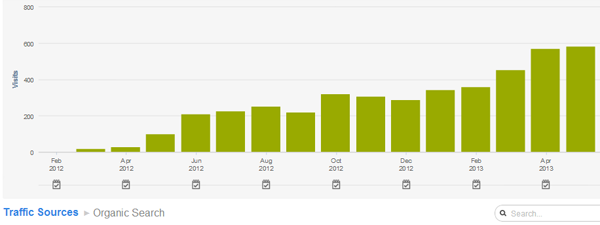
A recent study from Forrester Research found that organic (non-paid) search results were how most people found the websites they visited. 54% of people found sites with organic search results, 35% found sites with social media, 28% through website referrals and 18% through paid search results.
Leads resulting from organic search results are high-quality leads; they specifically searched using keywords that reflected something they wanted to learn more about. If they find you and convert as a lead by downloading your premium content offer, they're interested in learning more about the problems your product or service solves. That sure beats cold-calling people who are trying to duck your call, right? Getting found via high-converting organic search results is the cornerstone of a successful inbound marketing campaign. Here are 5 tips that will increase organic traffic to your website.
Identify the keywords buyers are using to learn about the problems your product/service solves
The first step in driving organic search traffic to your website is to identify keyword phrases that buyers use to search for your products/services on the web. You should also look for phrases that buyers use to research the problems your company solves. Use a keyword tool like the one included in HubSpot's internet marketing software or the free Google Adwords Keywords tool to help you develop your list.
Look for keywords that get a decent amount of monthly searches, but arent' too difficult to rank for (you can find this data in the keyword tools mentioned above.) Focus on long-tail keywords - those that are 4 words or longer. Instead of Restaurant, think Northern Virgnina Italian Restaurant. These long-tail keywords are easier to rank for and produce highly qualified search traffic. Someone searching for the Northern Virginia Italian Restaurant isn't looking for Afghan food. Developed targeted keyword lists for your different product/services lines, geographic locations and vertical industry targets.
Make sure your website is optimized for your targeted keywords
Having a great list of targeted keywords doesn't do you any good if you're not letting Google know that your website has information about them. Include your targeted keywords in your page titles, headers on your page and your website copy. Don't overdo it! Google penalizes websites that are overly optimized. Optimize for one to two keyword phrases per page and include them organically in your copy. The reader shouldn't be able to tell which keywords you're targeting from the way you write. When in doubt, follow this maxim: optimize for customers, not search engines. Give them a good experience when they come to your website.
This video from Google will give you a good understanding of how Google Search works:
Create content around your targeted keywords
Now that you've created targeted keywords and optimized your website, you need to create content around your targeted keywords. The way to do this is through blogging. Blogging is a sure-fire way to drive organic traffic to your website and to generate sales leads. Use targeted keyword phrases in your blog titles and organically in the blog post. Every time you publish a blog about a targeted keyword phrase, you create a new web page and send a signal to Google that you're creating fresh content about that keyword phrase. Keep in mind that the more you blog, the more organic traffic you will get. According to HubSpot, companies that blog 15 or more times per month get 5 times more traffic than those that don't blog.
Be consistent and persistent
Success in driving organic traffic to your website doesn't happen overnight. It takes time for Google and Bing to index your website and to develop domain authority around your targeted keywords. Pick a blogging frequency and stick with it! If you're just starting out, I recommend blogging once per week consistently. You look unprofessional if someone goes to your blog and sees that your last entry was 3 years ago. Once you're in a groove with your blogging, consider increasing your frequency. Remember, the more frequently you blog, the more orgnanic traffic you'll get.
You also need to be persistent in your blogging efforts. Don't give up if you're not getting immediate results! Good organic traffic flow results from consistent blogging over a period of time (see image below.) Be persistent and keep the end goal in mind - driving quality organic traffic to your website.

Review analytic data and adjust your tactics
Use internet marketing software like HubSpot or Google Webmaster Tools to analyze the results of your efforts. See which keyword phrases are driving traffic to your site and capitalize on them by creating new content around them. Look for keyword phrases that drive traffic that you didn't target. 16% of daily searches on Google are for keyword phrases that have never been searched before! You will likely find keyword phrases driving traffic to your site that you didn't expect to find. If you use internet marketing software like HubSpot, you can take your analysis one step further. You can identify the keyword phrases that drive traffic that converts to leads and customers. These are clearly keyword phrases that you want to exploit.
Search engine queries are how most people find the websites that they visit when researching topics important to them. Identify the right keyword phrases, optimize your website and create content around them to drive valuable organic traffic to your website. This will fill the top of your internet marketing funnel and create opportunities to generate leads and customers from your internet marketing efforts. If you'd like to learn more about how you can drive organic traffic to your website to drive business results, shedule a free consultation with us.







